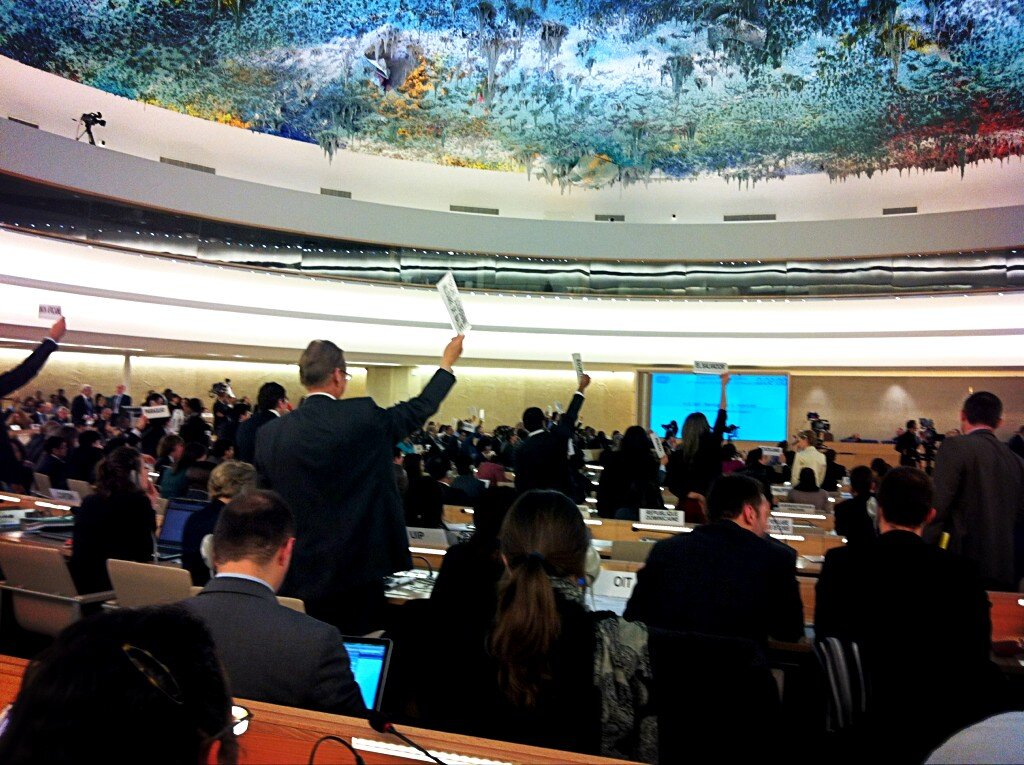On 23 June, as part of the 29th session of the UN Human Rights Council, the Cairo Institute for Human Rights Studies (CIHRS) in cooperation with the Euro-Mediterranean Human Rights Network (EMHRN) delivered an oral intervention before the UN Human Rights Council (HRC) on international crimes and means of accountability in Syria.
The intervention was made during the interactive dialogue session with the UN Commission of Inquiry on Syria, which presented its update to the Council on the impact of warring parties’ military actions on civilians and the access to humanitarian aid from 15 March to 15 June. “[The] deliberate decision to put civilians in harm’s way – has led to unspeakable suffering,” the Commission said. It also presented recommendations to states regarding the need to take serious and urgent steps to put an end to the conflict, reach a political solution to the crisis, suspend financial and military aid to warring parties in Syria, and implement means for effective accountability.
While the intervention by CIHRS and EMHRN commended the efforts of the UN Commission of Inquiry, it affirmed the international community’s failure to translate its recommendations for accountability for perpetrators into action, noting that impunity is a principal cause of the perpetuation of the crisis in Syria. The intervention added that any UN-sponsored political resolution to the conflict must be accompanied by concrete mechanisms for accountability that offer justice to victims and deter perpetrators. Further, CIHRS and EMHRN asked the UN Commission to continue to identify the individual criminal responsibility of perpetrators and to establish the chain of command that allowed and issued the orders to commit these crimes, to ensure accountability for all persons involved on all sides, regardless of their positions.
Responding to the intervention by the CIHRS and EMHRN, the chair of the UN Commission of Inquiry on Syria noted its recommendations and affirmed that the commission continues to examine the issue of individual criminal responsibility and is working to accurately link violations with perpetrators. He added that the Commission is maintaining a database of reported violations and is tracking the perpetrators from all parties as a means to identify commanders’ criminal responsibility for their subordinates’ actions as a prelude to accountability.
In the same context, the Geneva office of CIHRS, in conjunction with Human Rights Watch, Amnesty International, and EMHRN organized on the evening of 23 June a panel discussion on the deteriorating conditions in Syria to explore alternative accountability mechanisms for international crimes against the Syrian people.
The discussion featured Geraldine Mattioli-Zeltner, the Advocacy Director for Human Rights Watch’s International Justice Program; Syrian Lawyer and Human Rights Defender Anwar al-Bunni; and Woman Human Rights Defender Majd Sharbaji, the recipient of the International Women of Courage Prize.
Participants agreed that impunity in Syria was the prime reason for the sharp escalation in violations over the past four years. Lawyer Anwar al-Bunni said that the absence of accountability had encouraged perpetrators to commit more atrocities, which numerous reports attest are being committed in Syria daily. Yet, decision makers remain unable to stop the ongoing bloodshed, he said, adding that terrorism thrives whenever justice disappears.
Geraldine Mattioli-Zeltner focused on the role of the UN Commission of Inquiry in exposing perpetrators and bringing them to justice, pointing to the challenges facing the Commission. Most importantly, Syria is not a member of the International Criminal Court, and the establishment of any special international tribunal requires a UN Security Council resolution. In addition, questions continue to be raised about the transparency and efficacy of the tribunal proposed by the Arab League to hear crimes related to human rights violations in the region.
Mattioli-Zeltner said that one possible solution to be seriously considered might lie in the principle of universal jurisdiction, which gives all states the right to investigate the most serious international crimes, such as crimes against humanity. She noted that at the end of last year, a Swedish court sentenced a member of the Free Syrian Army to five years in prison on charges of torture, while in Germany, information gathered from Syrian refugees led to the identification of several crimes. Al-Bunni urged all states to pursue the same course, saying, “countries in the West and East, including Arab states, must open their courtrooms to the application of the principle of international jurisdiction, to hold perpetrators in Syria to account.”
Participants also urged UN member states to redouble their efforts to collect data, document violations in Syria, and share this information, as well as protect witnesses and victims in refugee camps, especially in Turkey and Jordan. They additionally called on the UN Commission of Inquiry on Syria to examine evidence by holding public hearings for victims and sending letters of notice to known perpetrators, proven by the UN Commission to have been involved in crimes that may amount to international crimes in Syria.
In the same context, Syrian rights defender Majd Sharbaji said that the absence of justice and accountability is the main factor for the growth of terrorist groups like the Islamic State in Iraq and the Levant (ISIL). She added that justice would not be achieved in Syria as long as the al-Assad regime remains in a position of power and faces no accountability for its crimes. Sharbaji concluded that years of discussions, reports, and debates on the situation in Syria have gone nowhere and thus far have not been translated into concrete action on the ground.
The panel discussion was attended by several diplomats and members of delegations including from the US, Canada, Denmark, Germany, Sweden, New Zealand, Greece, Russia, the EU, and Brazil.
Read the oral intervention HRC29.JOI.CoI.Syira.June23.En.final
Share this Post

